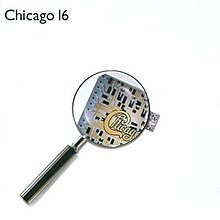Chicago 16
| Chicago 16 | ||||
|---|---|---|---|---|
 |
||||
| Studio album by Chicago | ||||
| Released | June 7, 1982 | |||
| Recorded | January–April 1982 in Los Angeles, California | |||
| Genre | Rock | |||
| Length | 41:51 | |||
| Label | Full Moon/Warner Bros. | |||
| Producer | David Foster | |||
| Chicago chronology | ||||
|
||||
| Singles from Chicago 16 | ||||
|
||||
| Professional ratings | |
|---|---|
| Review scores | |
| Source | Rating |
| AllMusic | |
Chicago 16 is the thirteenth studio album by the American band Chicago, released on June 7, 1982. It is the first album in a decade-long association with new label Warner Bros. Records, the band's first project to be produced by David Foster, and their first hit album since 1978's Hot Streets. It is also the first album since Chicago V (1972) not to feature Laudir de Oliveira on percussion. It is also the first studio album to be released two years after the previous, as every other studio album was released once per year.
The band brought in Sons of Champlin founder Bill Champlin as keyboard player and singer, to fill the past vocal parts of the late Terry Kath. The group also retained Chris Pinnick from the Chicago XIV sessions. Through the band's manager, Jeff Wald, and on suggestion of Danny Seraphine, producer David Foster would make contact with the band. Once they agreed to Foster producing the album (the band had considered him for 1980's Chicago XIV), the producer radically redefined Chicago's sound for the 1980s, with all of the latest technologies and techniques and introducing the significant use of outside songwriters and studio players. Three members of Toto lent their expertise to the sessions.
The soft rock leanings of Peter Cetera and Foster permeate much of Chicago 16. The band was moving to a new label after an entire career at Columbia. Robert Lamm was also unavailable for the majority of the album's production because of personal issues, and the once-prolific writer only shared a sole partial writing credit on the release. Percussionist Laudir de Oliveira was dismissed from the band after the Chicago XIV tour, as his Latin-American style would not fit with the new direction of the band.
...
Wikipedia
